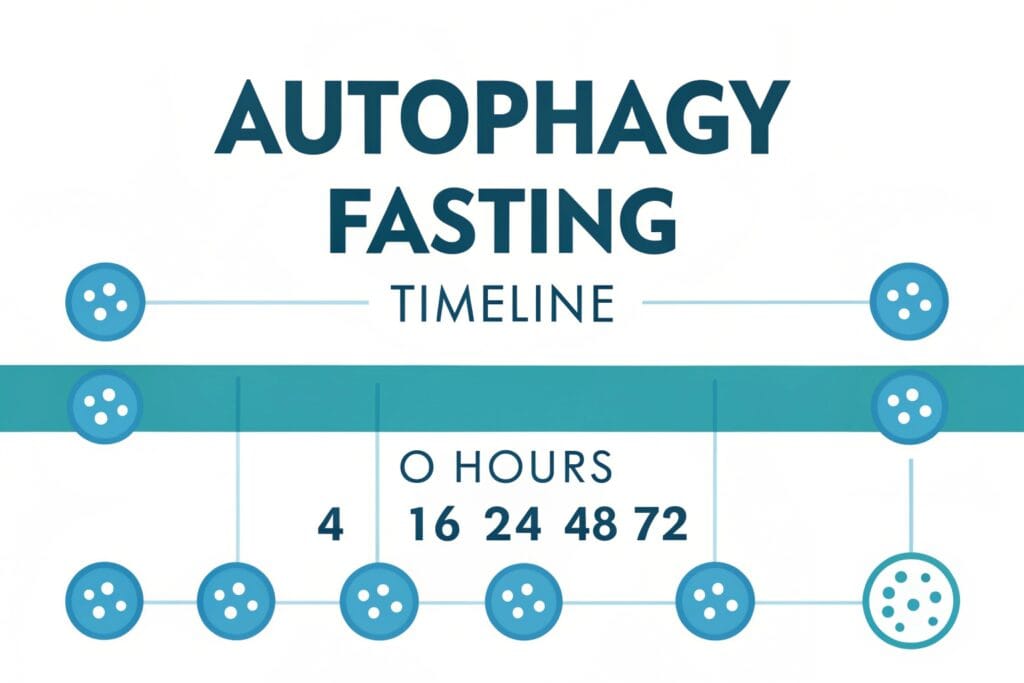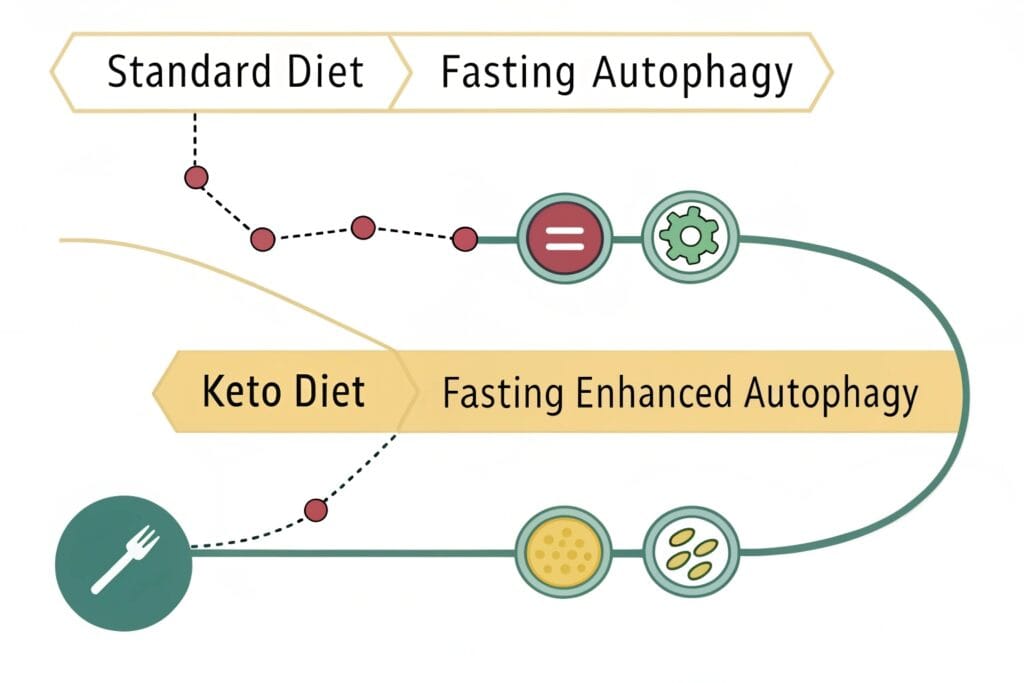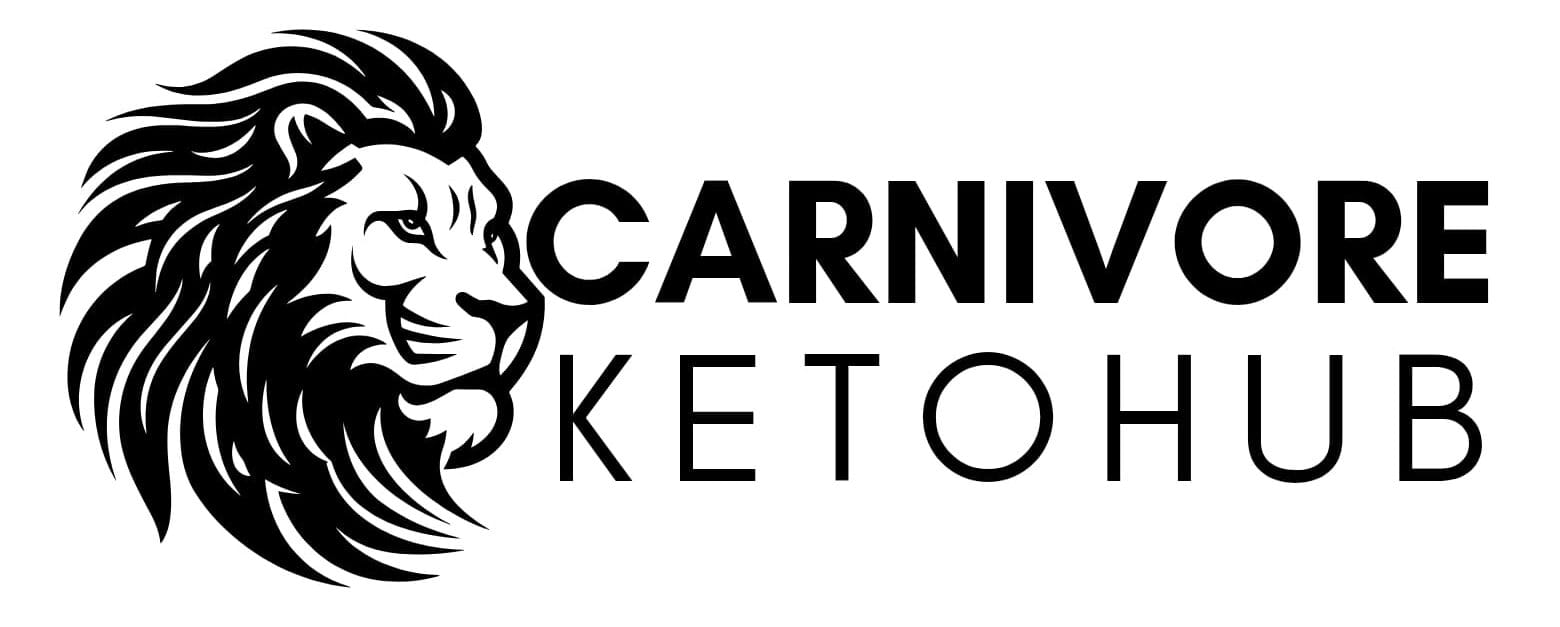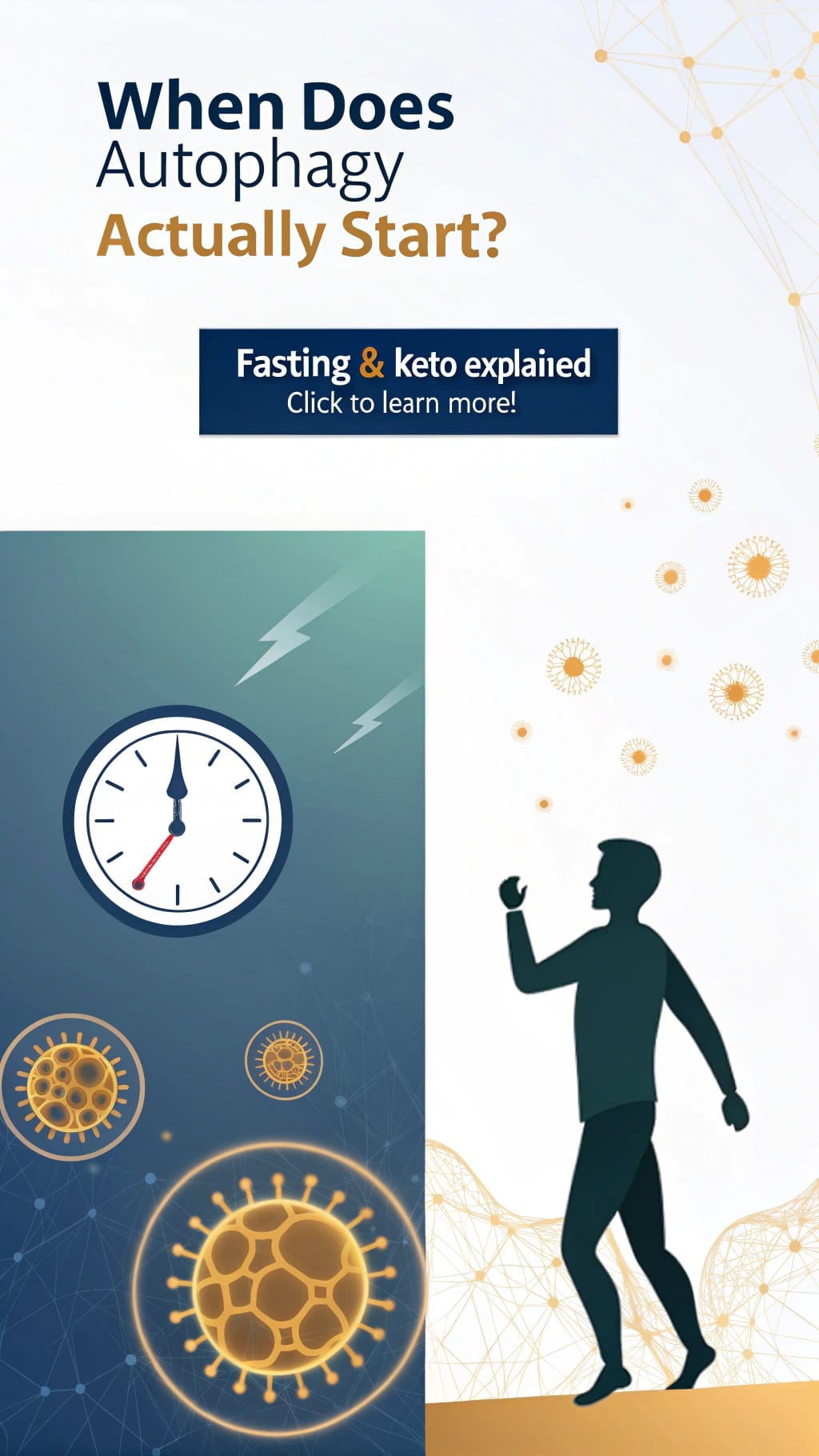Keto, Fasting & Autophagy: The Timeline You Need to Know
Autophagy: The Cellular “Self-Cleaning” Everyone’s Talking About
If you’ve been exploring the world of intermittent fasting or the ketogenic diet, you’ve likely encountered the term “autophagy.” This cellular cleanup process has become a hot topic in health and longevity circles, with many people adopting fasting protocols and low-carb lifestyles specifically to trigger this natural mechanism.
But amidst all the hype surrounding autophagy, one question remains persistently unclear: when does autophagy start? Whether you’re practicing time-restricted eating, extended fasting, or following a ketogenic diet, understanding the timeline of this crucial cellular process can help you optimize your approach.
Table of Contents
Spoiler Alert: It’s Not an On/Off Switch
Before diving into specifics, it’s important to set realistic expectations. Autophagy is not a simple on/off switch that activates at a precise hour mark. Rather, it’s a gradual process that’s always happening at some baseline level in your body, with significant boosts occurring under certain conditions—primarily nutrient restriction and metabolic shifts.
This post will explore the science behind when does autophagy start with various fasting durations and how ketogenic eating patterns might influence this timeline. We’ll separate fact from fiction and provide evidence-based insights into this fascinating cellular mechanism.
Crucial Disclaimer: This information is for educational purposes only and does not constitute medical advice. Always consult with your doctor or a qualified healthcare professional before making significant dietary changes or starting fasting protocols, especially if you have underlying health conditions.

Understanding Autophagy: Your Body’s Cellular Recycling Program
Simply put, autophagy is your body’s natural process of removing damaged or unnecessary cellular components and recycling their parts to maintain optimal cellular function. The term comes from Greek words meaning “self-eating,” which perfectly describes this intelligent self-cleaning mechanism.
During autophagy, your cells identify old, dysfunctional, or damaged proteins and organelles, encapsulate them in membranes called autophagosomes, and deliver them to lysosomes for degradation and recycling. This process helps:
- Remove potentially harmful cellular waste
- Recycle usable components for energy and building blocks
- Support cell survival during nutrient scarcity
- Potentially reduce inflammation and oxidative stress
- May play a role in longevity and disease prevention
While autophagy occurs continuously at low levels in all cells, certain conditions can significantly accelerate this process—which brings us to the central question of timing.
Learn more about the ketogenic diet and metabolism in our Ultimate Guide to Ketosis
It’s Not Just About Hours: Factors Influencing When Autophagy Ramps Up
When asking when does autophagy start, it’s essential to understand that multiple factors influence the timing and intensity of this process. Let’s explore the key elements that determine how long does it take for autophagy to start:
The Main Trigger: Nutrient Deprivation (Fasting)
Research has consistently shown that fasting is one of the most potent activators of autophagy. When food—particularly glucose and amino acids—becomes scarce, cellular signaling pathways shift to promote autophagy.
According to a 2018 review in the journal Cell, nutrient sensing pathways like mTOR (mammalian target of rapamycin) and AMPK (AMP-activated protein kinase) play critical roles in this process[^1]. When nutrients are abundant, mTOR is active and suppresses autophagy. During fasting, mTOR activity decreases while AMPK increases, directly promoting autophagy.
Cellular Energy Stress (Keto Diet / Calorie Restriction)
Beyond complete food restriction, energy stress from calorie restriction or carbohydrate limitation (as in a ketogenic diet) can also stimulate autophagy. Both approaches lead to decreased insulin levels and metabolic shifts that favor autophagy.
A 2019 study published in Cell Metabolism demonstrated that ketone bodies—which increase during ketosis—may themselves stimulate autophagy through various mechanisms, suggesting that nutritional ketosis might enhance this process even without complete fasting[^2].
Fasting Duration: A Key Factor!
The duration of your fast significantly impacts autophagy intensity. Generally speaking, autophagy fasting timeline research suggests that longer fasting periods correlate with stronger autophagy signals, though the exact timing varies between individuals and tissues.
Degree of Ketosis / Keto-Adaptation
For those following a ketogenic diet, the degree of ketosis and metabolic adaptation can influence how quickly significant autophagy begins during fasting periods. Research suggests that keto-adapted individuals may enter autophagy more rapidly when fasting begins[^3].
Individual Factors (Metabolism, Age, Health Status)
It’s crucial to acknowledge that individual variations significantly influence how long does it take for autophagy to start. Factors including:
- Age (autophagy efficiency naturally declines with age)
- Metabolic health (insulin sensitivity/resistance)
- Body composition
- Genetics
- Previous fasting experience
- Baseline diet patterns
All play important roles in determining your personal autophagy timeline.
Exercise: Another Potent Stimulus
Physical activity, particularly high-intensity and resistance training, has been shown to stimulate autophagy independent of nutritional status. A 2012 study in Nature demonstrated that exercise induces autophagy in multiple tissues, suggesting it could enhance the benefits of fasting or ketosis[^4].
Breaking Down the Timeline: What Science & Experience Suggest
Let’s explore what current research suggests about the autophagy fasting timeline—while remembering that this varies between individuals and is difficult to measure precisely outside laboratory settings.

The “16-Hour Mark”: Is It Enough?
Many intermittent fasting advocates cite the 16-hour mark as the point when autophagy begins to increase significantly. But is 16 hours fasting enough to trigger meaningful autophagy?
Based on available research, 16 hours likely represents a minimum threshold where:
- Liver glycogen becomes significantly depleted
- Insulin levels have dropped considerably
- Cellular recycling processes begin increasing above baseline
For many people—especially those new to fasting or coming from high-carbohydrate diets—16 hours may indeed mark the beginning of enhanced autophagy, though perhaps not peak levels. This timeframe makes the popular 16:8 intermittent fasting pattern potentially beneficial for gradual autophagy stimulation.
Learn more about Intermittent Fasting strategies in our comprehensive guide
18-24 Hour Fasts: Likely a More Significant Stimulus
Research from the University of Graz suggests that autophagy markers increase more substantially during fasts extending past 20 hours[^5]. For many individuals, the 18-24 hour window appears to represent a “sweet spot” where:
- Fat oxidation increases significantly
- Ketone production rises
- Cellular cleanup processes intensify
This timing aligns with OMAD (One Meal A Day) or 23:1 fasting protocols, which many practitioners find sustainable and effective.
Longer Fasts (36h, 48h, 72h+): Deep Autophagy
Extended fasting periods of 36 hours or longer are generally believed to induce more profound autophagy. A 2019 study in Cell Reports demonstrated that autophagy markers increased progressively during prolonged fasting, with significant changes observed after 24-48 hours[^6].
However, it’s important to note that longer fasts require proper preparation, gradual adaptation, and possibly medical supervision—they’re not appropriate for everyone and should be approached with caution.
Autophagy Fasting Timeline (Estimated)
- 0-4 hours: Baseline autophagy (normal physiological levels)
- 4-16 hours: Gradual increase as insulin decreases
- 16-24 hours: Moderate autophagy increases for most people
- 24-48 hours: Significant autophagy activation
- 48+ hours: Potentially maximal autophagy benefits
Note: This timeline is approximate and varies significantly between individuals
How Does the Keto Diet Help Initiate Autophagy?
The ketogenic diet creates metabolic conditions that may enhance and accelerate autophagy, potentially altering the timeline of when does autophagy start during fasting.
Lower Baseline Insulin: Priming the System
One of the most significant benefits of a well-formulated ketogenic diet is consistently lower insulin levels. Since insulin inhibits autophagy through mTOR activation, maintaining lower baseline insulin can keep your cells more receptive to autophagy signals[^7].
In practical terms, this means someone following a strict ketogenic diet might experience enhanced autophagy earlier in a fast compared to someone eating a standard high-carbohydrate diet.
Faster Entry During Fasting
Research suggests that keto-adapted individuals typically enter ketosis more rapidly during fasting periods, which may correlate with earlier autophagy activation[^8]. When you’re already burning fat for fuel and producing ketones, the metabolic switch during fasting is less dramatic, potentially allowing autophagy mechanisms to activate sooner.
Check out our Keto-Carnivore Recipes for delicious low-carb meal options
Sustained Ketosis: Enhanced Baseline Autophagy?
Some research indicates that nutritional ketosis alone—even without fasting—may promote higher baseline autophagy than standard dietary patterns. A 2019 study in the International Journal of Molecular Sciences found that the ketone body beta-hydroxybutyrate (BHB) directly inhibits NLRP3 inflammasome activation, which may indirectly enhance autophagy mechanisms[^9].
However, more research is needed to fully understand how sustained ketosis affects autophagy independent of fasting.

Can You “Feel” Autophagy Happening? Separating Fact from Fiction
With growing interest in autophagy, many wonder if there are physical sensations or signs indicating the process is underway.
Are There Physical Signs You’re in Autophagy?
The short answer: No, there are no reliable, direct physical sensations that definitively indicate autophagy is occurring at high levels.
Autophagy is a microscopic, cellular process that doesn’t produce immediate, perceptible sensations. What many people attribute to “autophagy feelings” are often symptoms of:
- Ketosis (keto breath, increased energy)
- Transitioning to fat-burning (hunger changes, mental clarity)
- Hormonal adjustments during fasting (mood changes)
It’s important not to confuse these metabolic state indicators with autophagy itself. Currently, accurate measurement of autophagy requires sophisticated laboratory techniques that aren’t available for home use.
The benefits of enhanced autophagy—improved cellular function, potential longevity effects, metabolic health—typically manifest over longer timeframes rather than as immediate sensations. Focus on consistency with your fasting or ketogenic approach rather than seeking specific feelings.
Learn why some people aren’t losing weight on keto and how to fix it
The Takeaway: Patience and Healthy Practices Matter Most
When exploring when does autophagy start and how long does it take for autophagy to start, remember these key points:
- Autophagy is gradual and variable – It’s not an on/off switch but a progressive process influenced by multiple factors
- The 16-hour threshold is a reasonable starting point – For many people, is 16 hours fasting enough for some autophagy benefits? Likely yes, but perhaps not optimal
- Ketogenic diets may enhance the timeline – By maintaining lower insulin and higher ketones, keto eating patterns may support earlier and more efficient autophagy
- Individual factors matter significantly – Your personal metabolism, health status, and dietary history all influence your unique autophagy timeline
- Consistency trumps timing obsession – Regular practice of intermittent fasting and/or well-formulated ketogenic eating likely provides more benefit than occasionally hitting the “perfect” autophagy window
Rather than fixating on the exact hour when autophagy peaks, focus on developing sustainable fasting and nutritional strategies that you can maintain long-term. The cumulative effects of consistent practice will likely yield greater benefits than occasional “optimal” fasting periods.
Remember that both intermittent fasting and ketogenic diets offer numerous health benefits beyond autophagy, including improved insulin sensitivity, metabolic flexibility, and potentially reduced inflammation.
What are your favorite ways to support cellular health? Have you experienced benefits from combining fasting with a ketogenic diet? Share in the comments!
Read our Ultimate Guide to Ketosis
Learn more about Intermittent Fasting Strategies
Frequently Asked Questions About Autophagy Timing
Does autophagy start after 16 hours of fasting?
While autophagy occurs at baseline levels continuously, research suggests that significant autophagy enhancement begins around the 16-hour fasting mark for many individuals. However, this timing varies based on metabolic health, dietary history, and whether you’re following a ketogenic diet. For those on standard high-carb diets, autophagy may take longer to ramp up significantly compared to those who are fat-adapted.
How can I tell if autophagy is happening?
There are no reliable external signs or sensations that definitively indicate autophagy is occurring. Unlike ketosis, which has measurable markers like breath acetone or blood ketones, autophagy can only be accurately measured through sophisticated laboratory techniques. What many people attribute to “autophagy feelings” are typically signs of ketosis or metabolic adaptation during fasting.
Does coffee break autophagy during fasting?
Current research suggests that black coffee without additives likely doesn’t significantly inhibit autophagy during fasting. In fact, some studies indicate coffee may contain compounds that could potentially enhance autophagy. However, adding cream, sugar, or MCT oil to coffee will trigger insulin responses that may reduce autophagy benefits.
Is autophagy better with keto or fasting?
Both ketogenic diets and fasting can stimulate autophagy, but combining them appears to provide synergistic benefits. Ketogenic eating may prime your body for more efficient autophagy when you do fast, while fasting intensifies the autophagy signals. For optimal benefits, many experts recommend a well-formulated ketogenic diet combined with time-restricted eating or intermittent fasting protocols.
How long do you need to fast for maximum autophagy?
Research suggests that autophagy benefits continue to increase with longer fasting durations, with significant enhancement typically observed between 24-48 hours of fasting for most people. However, the relationship isn’t linear indefinitely, and there may be diminishing returns after 72 hours. Extended fasting should only be undertaken with proper preparation and potentially medical supervision.
Conclusion: Understanding Your Personal Autophagy Journey
As we’ve explored throughout this article, the question of when does autophagy start doesn’t have a one-size-fits-all answer. The cellular self-cleaning process exists on a continuum, influenced by your unique metabolism, dietary patterns, and lifestyle choices.
What’s clear from the research is that both fasting and ketogenic diets create metabolic conditions favorable to enhanced autophagy. Whether you’re wondering is 16 hours fasting enough or curious about the autophagy fasting timeline, the key is finding sustainable practices that work for your body and lifestyle.
Rather than obsessing over hitting the perfect autophagy window, focus on consistency with your chosen approach. Regular intermittent fasting combined with a well-formulated ketogenic diet provides a powerful foundation for cellular health that extends far beyond autophagy alone.
Remember that autophagy is just one of many mechanisms through which nutritional strategies like fasting and keto benefit health. The improvements in insulin sensitivity, metabolic flexibility, inflammation reduction, and energy stability are equally valuable outcomes of these approaches.
Start where you are, progress gradually, and pay attention to how your body responds. For some, daily 16:8 intermittent fasting combined with keto eating provides sufficient autophagy stimulation and sustainable results. Others may benefit from occasionally incorporating longer fasting periods for deeper cellular cleaning.
What autophagy-boosting strategies have you tried? Have you noticed differences in your energy, focus, or overall well-being? Share your experiences in the comments below!
Discover how keto impacts brain health beyond autophagy
Learn about the pros and cons of the carnivore diet approach
References & Further Reading
[^1]: Kim, J., & Guan, K. L. (2018). mTOR as a central hub of nutrient signalling and cell growth. Nature Cell Biology, 21(1), 63-71.
[^2]: Puchalska, P., & Crawford, P. A. (2017). Multi-dimensional Roles of Ketone Bodies in Fuel Metabolism, Signaling, and Therapeutics. Cell Metabolism, 25(2), 262-284.
[^3]: Mattson, M. P., Longo, V. D., & Harvie, M. (2017). Impact of intermittent fasting on health and disease processes. Ageing Research Reviews, 39, 46-58.
[^4]: He, C., Bassik, M. C., Moresi, V., et al. (2012). Exercise-induced BCL2-regulated autophagy is required for muscle glucose homeostasis. Nature, 481(7382), 511-515.
[^5]: Jansen, H. J., van Essen, P., Koenen, T., et al. (2012). Autophagy activity is up-regulated in adipose tissue of obese individuals and modulates proinflammatory cytokine expression. Endocrinology, 153(12), 5866-5874.
[^6]: Bagherniya, M., Butler, A. E., Barreto, G. E., & Sahebkar, A. (2018). The effect of fasting or calorie restriction on autophagy induction: A review of the literature. Ageing Research Reviews, 47, 183-197.
[^7]: Cabo, R. D., & Mattson, M. P. (2019). Effects of Intermittent Fasting on Health, Aging, and Disease. New England Journal of Medicine, 381(26), 2541-2551.
[^8]: Volek, J. S., & Phinney, S. D. (2012). The Art and Science of Low Carbohydrate Performance. Beyond Obesity LLC.
[^9]: Youm, Y. H., Nguyen, K. Y., Grant, R. W., et al. (2015). The ketone metabolite β-hydroxybutyrate blocks NLRP3 inflammasome-mediated inflammatory disease. Nature Medicine, 21(3), 263-269.
Enjoy, Review – We Value Your Opinion!
There are no reviews yet. Be the first one to write one.

